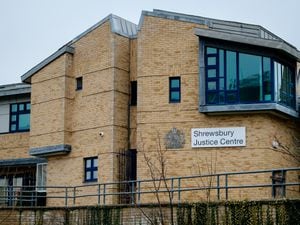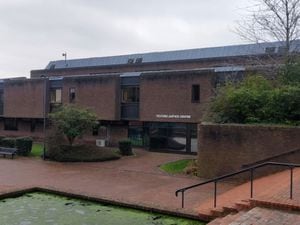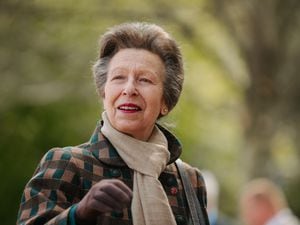The NHS heroes rising to the coronavirus challenge at Shropshire's orthopaedic hospital
There have been dramatic changes at Shropshire's orthopaedic hospital to cope with the coronavirus crisis, but staff are rising to the challenge.
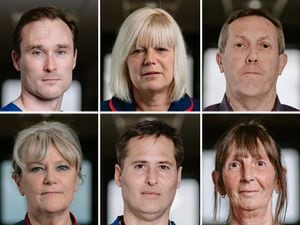
Part of the county's response to the outbreak was to ensure acute hospitals have capacity to treat large numbers of Covid-19 patients.
It meant moving trauma services to The Robert Jones and Agnes Hunt Orthopaedic Hospital, near Oswestry, requiring people to work outside their comfort zones and in different roles.
Serving military surgeon Lieutenant Colonel Carl Meyer, who works at both RJAH and Royal Shrewsbury Hospital, was involved in the planning.
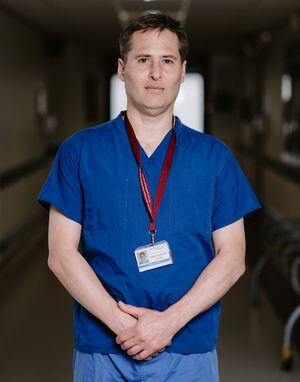
"We developed a rapid response trauma team to work alongside the emergency doctors at RSH," said Lt Col Meyer, a consultant in trauma and lower limb arthroplasty.
"They ensure trauma patients are quickly assessed, treated and evacuated to Oswestry without being admitted.
"Despite difficult working conditions, the team has shown real commitment.
"Several of our junior doctors have been admitted with Covid through the course of their duties.
More Covid-19 coverage:
"Recently, one of our junior doctors was critically ill with Covid.
"He received exceptional care from the medical teams and intensivists at RSH and recovered.
"This gives us confidence to keep working hard."
Lt Col Meyer says trauma surgery is different from planned procedures as it is unpredictable, with difficult decision making.
"Trauma patients have multiple medical problems including Covid," said the 47-year-old, from Shrewsbury.
"Surgery takes place in full personal protective equipment (PPE). This is uncomfortable and makes communication in theatre difficult.
"It has required a complete change in our theatre practice.
"Despite these challenges, an effective, high quality trauma service has been maintained.
"The staff have risen to the challenge and shown immense flexibility."
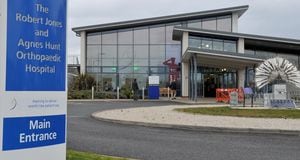
Being in the forces, Lt Col Meyer is used to working under difficult circumstances for prolonged periods.
He says the current situation is no different but there has been sound planning and an excellent response to the pandemic in Shropshire.
As well as providing a trauma service and performing hip and knee replacements, he also runs the veterans’ orthopaedic service at RJAH.
He says his main concern is for his veteran patients.
"The Covid crisis has meant the veterans’ orthopaedic service has been put on hold whilst we deal with the pandemic," he said.
"The patients come from all over the UK and further afield.
"It is important for them to know we will resume a full service as soon as it is safe to do so.
"We will keep them informed of this through the hospital website and social media."
During her 17 years at RJAH, Heather Owen has worked in various areas as a nurse and now manages Powys Ward.
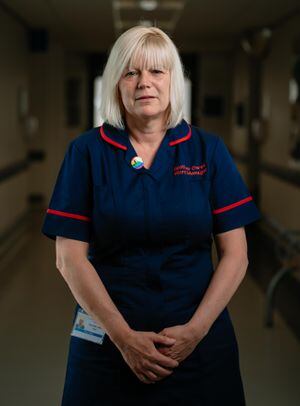
The ward was predominately a surgical ward for elective patients of hips, knees and spinal surgery.
But since the Covid-19 outbreak it has changed dramatically to a trauma orthopaedic ward supporting RSH, Princess Royal Hospital in Telford and Wrexham Maelor Hospital to help ease pressure on beds.
It has involved caring for patients with the virus and, despite having their own anxieties, Heather says staff have embraced the changes with an "extremely positive attitude".
The 51-year-old, who lives in Rhos-y-gadfa near Gobowen, said: "All our patients are treated with dignity and respect like any other patient in the hospital would be.
"Families have been kept informed on a regular basis, they can ring in at any time.
"We also have a facility where they can face-time their family members.
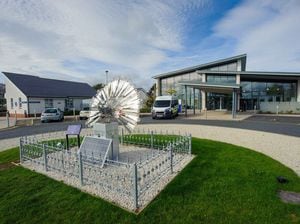
"There are many dynamics to my role but one of the biggest is supporting my staff to deliver safe practice ensuring a caring, friendly and professional environment for all.
"Staff wellbeing is paramount, ensuring that staff feel supported, feel confident and safe in their roles.
"The ward has seen a lot of changes to our working practice and naturally the staff were scared and nervous about working in this new environment.
"However, we adopted the changes really well and the ward has been a success.
"Morale has been low at times due to the unfamiliar change to our patient group and Covid-19, however, this was soon overcome by the fantastic team on Powys Ward, together with the support of Callum MacLennan, Jackie Payne and Jane Thompson from RSH."
She also paid tribute to the public for their support, adding: "It has been outstanding, from the clapping on Thursday nights to people offering to make us things so when we are wearing PPE it’s more comfortable, and companies donating items such as hand creams and drinks.
"We feel humbled and at times guilty because at the end of the day we are nurses just doing our job like everyone else doing their jobs."
Julie Roberts, assistant chief nurse at The Robert Jones & Agnes Hunt Orthopaedic Hospital, actually retired in April but felt a moral duty to return to support her colleagues – coming back just two days later.
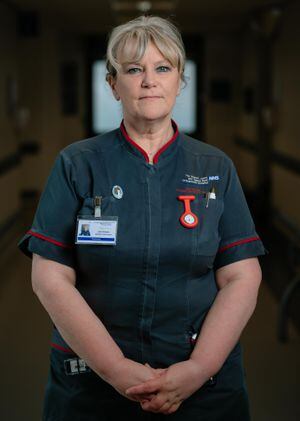
She leads, supports and oversees the infection prevention and control team, end of life care services and key Covid-19 training.
The 55-year-old, from Oswestry, says it has become the busiest time she has ever experienced throughout her career.
"We are committed to protecting patients, staff and visitors from the risk of healthcare associated infections and ensure that standard infection control precautions are used by all staff, in all care settings, at all times, for all patients.
"They are the basic infection prevention and control measures necessary to reduce the risk of transmission of infectious agents from both recognised and unrecognised sources, which include blood and other body fluids.
"We also advise staff in all areas on the correct use of personal protective equipment (PPE), by following the national guidance that is issued.
"Caring for an individual and their family at the end of their life, and after death, is an enormously important part of care and a privilege.
"There is only one chance to get it right and it needs careful co-ordination, to make sure everything that needs to happen happens, as there are so many restrictions during this current crisis."
The infection prevention and control team have been working long hours and are finding it extremely challenging.
"I feel that I’ve been on an emotional rollercoaster," Julie said.
"I know it is normal to be feeling stressed, anxious and scared right now, as this crisis is unlike anything I’ve experienced before, and there is still so much we don’t know.
"I am deeply saddened that so many healthcare staff have lost their lives from the virus, and my condolences go out to all their families, friends and colleagues."
Dr James Neil is a consultant anaesthetist and associate medical director for Covid-19 at RJAH.
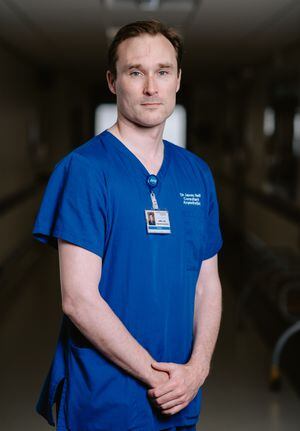
His role normally involves giving anaesthetics for orthopaedic operations, leading the high dependency unit and working in pre-operative assessment, reviewing patients before they come in for surgery.
Dr Neil said: "I’m now working with the trust’s executive team as the clinical representative for Covid planning.
"This has involved the complete reorganisation of our hospital trust to serve the needs of the whole of Shropshire by providing the trauma service at RJAH.
"I have also been involved in county wide contingency planning for different scenarios depending on the progress of the pandemic, and how that might change the needs of the community."
The anaesthetic department is now working flexibly to support the trauma service.
The team are also helping to manage patients’ medical conditions, whilst they are in hospital, and are providing a pain management service for patients with fractures.
Dr Neil said: "I’ve been involved with Covid patients on the wards and on high dependency.
"It is obviously more challenging for staff to care for them than in normal circumstances, but everyone has adapted well.
"Visiting has been very severely curtailed, outside of end of life care, so the wards have been using more novel methods to allow communication between patients, relatives and staff.
"These have involved anything from socially distanced visits, in limited cases, to use of mobile phones, and Facebook Portal devices."
He says at first there was an understandable uncertainty about what was going to happen, but things are now a little more stable and the whole hospital has pulled together.
But there are still challenges ahead.
The 44-year-old, of Shrewsbury, said: "The greatest challenge for us and the whole country is going to be how to get back to a more normal way of life.
"So much of this will depend on the progress of lockdown, and how successful the exit proves."
Logistics manager Mark Evans says the pandemic has been challenging, particularly trying to monitor, order, store and deliver the relevant PPE needed to keep the clinical staff safe.
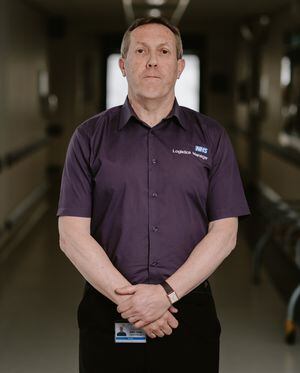
He says there is an air of nervousness and uncertainty within the trust but staff are trying to be upbeat and positive.
The 58-year-old, from Oswestry, said: "As part of the estates and facilities team, I currently work a seven day week to support all areas of the hospital and although there is an air of uncertainty and apprehension, we are all working together to keep morale high.
"The only issues we are facing is ensuring we can get the stock to the clinical staff as quickly as it is delivered to ensure the patients have all they need to aid their recovery.
"The support I have received from my fellow workers within the trust and the support from the wider community has been overwhelming and humbling.
"As a born and bred Oswestrian, I am proud to be part of this amazing professional organisation."
Angie Davies is a cleanliness technician on Ludlow Ward, which is currently being used as the trust’s designated isolation area for Covid-19.
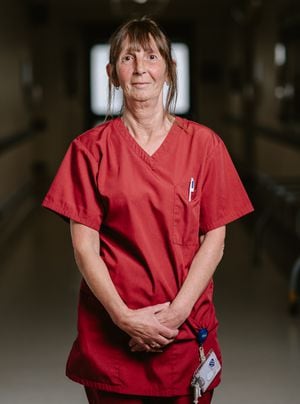
She makes sure the ward is kept spotless and free of infections, stopping along the way to chat to patients which she describes as "a really lovely part" of her job.
Getting used to wearing PPE has become the new norm.
"It’s extremely busy but we’re used to being busy," said Angie, who lives in Oswestry.
"It’s been hard when we’ve lost patients; that’s been extremely sad, especially as they haven’t been with their families."
She says morale on the ward is as good as it can be and support from her colleagues and the public has been wonderful.
"I work with the most amazing team of people," she said.
"I’m in awe of the work of my colleagues. If they were caring for my mum, I’d feel happy and at ease.
"I’m feeling okay. As a team we had a few wobbles behind the scenes a couple of weeks ago but I think that’s only natural, given what’s going on right now.
"Of course, we didn’t let that show in front of patients.
"That was probably our first real low point throughout this whole pandemic.
"Outside of work, I’m also finding it hard at times, I’m missing seeing my family, particularly my daughters and grandchildren, but I feel thankful for the normality and routine that work is giving me right now. Some people aren’t that lucky at the moment.
"The 8pm clap for the NHS and key workers has been really lovely to see – it’s made me feel quite emotional."

